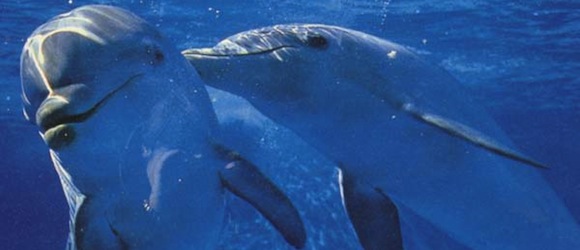Could Whales and Dolphins Get Legal Rights Within Our Lifetimes?
The Future Is Now!

Such is the question posed (and that will eventually by answered) by Steven M. Wise. In the past few decades, biologists have whittled away at what were once considered to be exclusively human traits. The research of Jane Goodall, for example, that showed that Chimpanzees are capable of using and modifying objects in their surroundings as tools, was incredibly controversial in its day. Decades later, we have scientists openly considering the idea of reclassifying dolphins as “non-human persons” rather than animals. (Or, to my nerdy mind, reclassifying them as ramen instead of varelse.)
Whether or not this should happen or will happen is not really something I’m prepared to make definitive statements about. But I do find it fascinating that there’s enough science out there on the subject that we’ve come to the point where anyone is seriously considering a campaign to give cetaceans legal rights as persons instead of objects.
Wise and his organization, the NonHuman Rights Project, were profiled in Wired today, and while Wise’s goals are quite lofty, he has drawn some lines for himself. Previous cases that attempted to argue that dolphins and whales should be granted personhood status include a suit in the United States Ninth Circuit court in which cetaceans harmed by Navy sonar exercises were denied legal standing and a lawsuit that unsuccessfully argued that Seawold’s animal stars are enslaved under the 13th Amendment. From Wired:
Those suits were well-meaning but misguided, said Wise, who believes the plaintiffs erred in seeking full-blown legal standing, or the right to participate in a lawsuit, rather than starting with the basics of personhood. Once that’s granted, argues Wise, discussion can begin over which rights a non-human person should have.
For example, nobody will argue that SeaWorld’s orcas have a right to free speech or guaranteed medical care — but they could have rights to freedom from imprisonment or captive breeding.
Free speech is indeed a hard right to implement if, even though there’s evidence that cetaceans have language (and even regionally specific culture and names), it’s a language we not yet capable of comprehending or translating. But Wise is optimistic: he’s not trying to hammer out every detail of how our legal system would have to change to recognize the sentience of dolphins and whales, just find a judge with a “fair reading of legal precedent and a willingness to consider the notion that intelligence, autonomy and feeling, not taxonomic designation, is what makes beings eligible for legal rights.” It certainly wouldn’t be the first time that a human society has had to expand its definition of who gets to be a person under the eyes of the law… just the first time that we’ve done it for someone of a different species, which is depressing enough in and of itself.
In fact, I can think of several areas of criminal and medicinal practicing law that I’d rather not have to wrap around dolphin behavior, so I guess I’m just not read to climb aboard the SeaQuest DSV.
Read the entire article at Wired!
Have a tip we should know? tips@themarysue.com